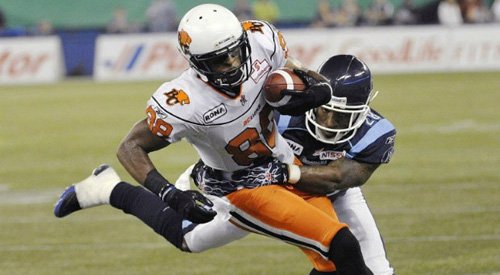
How the NFL sells off the field
Football in general’s long involved a strict divide between on-field and off-field concerns. Most analytical pieces on a team’s chances in a given year involve a focus on the players, the coaching scheme, previous years’ statistics, the schedule and so forth. However, there’s reason to believe that supposedly off-field factors like a team’s popularity, financial situation and fan intensity can make a substantial difference at times, and there’s evidence that the importance of those factors may be growing across different levels of football.
The key example of this comes in the college football ranks, of course, as they have to recruit players rather than draft one. A program’s history can be a key factor here, but facilities, fan support, and coaching staff can also make a huge difference. Consider Washington State, for example, where new head coach Mike Leach has brought massive amounts of interest to a program often overshadowed by other Pac-12 teams. From Tim Booth of The Associated Press:
In just eight months since he was introduced to the Cougar faithful last December, Leach’s name alone has rejuvenated a football program that had become mired at the bottom of the Pac-12 Conference. He is an outsider, not associated with Washington State in any way, but instantly has morphed into the ”Pirate of the Palouse,” the coach everyone wants to talk to, be seen with or say they know.
Name another coach who is invited to a celebrity wedding – Matthew McConaughey – then gets name-dropped on late-night television.
The amount of buzz around Washington State football is unprecedented. The Cougars won four games in 2011 and yet nearly 11,000 turned out for the spring game in Spokane, Wash., in April.
Within hours of his hiring, pirate themes were already being added to the Cougars logo, whether it be an eye patch or a pair of swashbuckling swords.
Many would cite that as just media buzz, but media buzz isn’t as purely off-field as one might think.
[php snippet=1]
Consider the difference in the Cougars’ recruiting rankings from 2011 to 2012. According to Rivals, Washington State pulled in the 72nd-best class nationally in 2011, with no five-star commits, one four-star commit and 12 three-star commits. That put them behind the likes of Vanderbilt, Wake Forest and Wyoming.
Meanwhile, Leach was only hired in December 2011, but he managed to make a difference in their 2012 recruiting class before coaching a game; this year’s class is ranked 55th nationally, and includes two four-star recruits and 15 three-star recruits. Leach will still have to translate the off-field hype into on-field improvement if he wants that rise to keep going, but he’s done a lot for the program before ever putting on a headset.
What about the professional ranks, where players are distributed by a draft rather than recruiting and a salary cap usually comes into play? Well, selling a program off the field can still make a difference.
One example in the CFL comes from the Saskatchewan Roughriders, who have turned their immense province-wide popularity into a way to grab some of the best free agents with local ties, such as their pickup of star guard Brendon LaBatte this past summer. The B.C. Lions have also benefited from their team’s atmosphere and reputation, which has let them add all-stars like defensive backs Byron Parker and Lin-J Shell and even keep players like Khalif Mitchell who had NFL interest.
It’s not just about recruitment, either, as passionate home fans can make a difference in individual games; the Winnipeg Blue Bombers have been struggling this season, but the fans are still turning out in droves and making Canad Inns Stadium a difficult place for opposing offences, which has been a factor in the Bombers’ 2-1 home record (they’re 0-4 on the road).
Even the NFL’s impacted by off-field concerns. Good management’s certainly a factor in the perennial accomplishments of teams like the Green Bay Packers and Pittsburgh Steelers, but their fans and stadiums definitely give them a boost at home. Meanwhile, less-popular teams like the Buffalo Bills have to overpay if they want to land a star like Mario Williams, and the uncertainty about future locations for teams like Jacksonville certainly isn’t helping them. The NFL’s draft and tight salary cap help distribute things a little more evenly, but a solid financial footing and popularity with local fans can be a massive advantage for a team.
At all levels of football, selling the product off the field’s becoming more important to the ability to put forth a good product on the field, and that’s why we’re seeing more and more unconventional moves from coaches and administrators, such as Vanderbilt head coach James Franklin handing out ice cream and offering to go to backyard parties, or Leach answering fans’ questions on Reddit. It may be what happens on the field that ultimately determines a team’s success, but off-field factors contribute to which players who have out there and how they perform. Thus, next time you see your favourite team’s coach out doing a publicity stunt, don’t presume he’s wasting his time. You sometimes need a little Glengarry Glen Ross to win on any given Sunday.
[php snippet=1]

